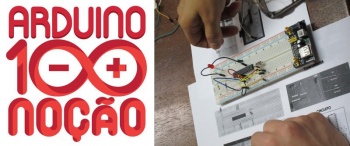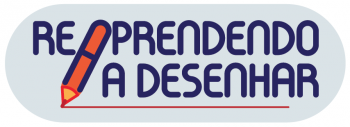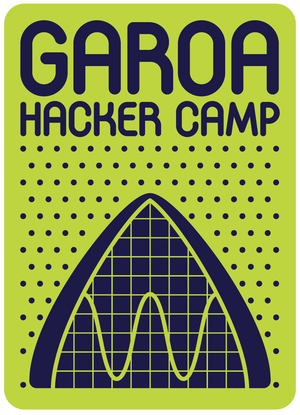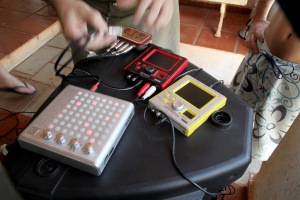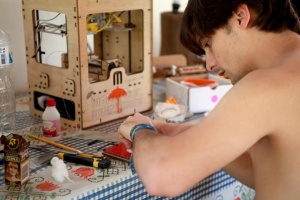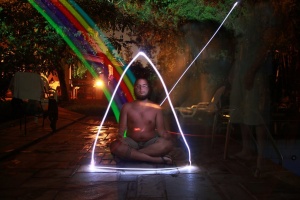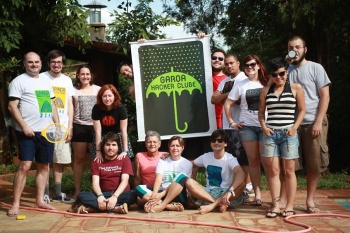Mudanças entre as edições de "Mozilla-Garoa proposal"
| Linha 7: | Linha 7: | ||
== History == |
== History == |
||
| − | Garoa Hacker Clube, the first Brazilian hackerspace, located in the city of São Paulo, was founded by the mobilization of a group of enthusiasts with the idea of forming a hackerspace in Brazil. The group was initially mobilized via web social networks (ning.com) and, later on, met in person at universities, congresses and other meetings. |
+ | '''Garoa Hacker Clube''', the first Brazilian hackerspace, located in the city of São Paulo, was founded by the mobilization of a group of enthusiasts with the idea of forming a hackerspace in Brazil. The group was initially mobilized via web social networks (ning.com) and, later on, met in person at universities, congresses and other meetings. |
| − | After about a year of online discussions and planning, the group started to meet in regular basis at University of São Paulo (USP) and, less than two months later, and still without an official name, moved to what today is half of its current physical space: a 12 square-meters basement in the House of Digital Culture ([http://www.casadaculturadigital.com.br Casa da Cultura Digital]). Gradually the group started to get its identity better defined, which culminated in the choice of a name to represent the local culture, our goals and our identity. |
+ | After about a year of online discussions and planning, the group started to meet in regular basis at '''University of São Paulo (USP)''' and, less than two months later, and still without an official name, moved to what today is half of its current physical space: a 12 square-meters basement in the '''House of Digital Culture''' ([http://www.casadaculturadigital.com.br '''Casa da Cultura Digital''']). Gradually the group started to get its identity better defined, which culminated in the choice of a name to represent the local culture, our goals and our identity. |
| − | With the start of regular activities, such as |
+ | With the start of regular activities, such as '''Arduino Night''', the '''Turing Club''' and the '''Hackdays''', the space got established as a meeting point for hackers and such, so that one can say "let's go to Garoa! " with the certainty of finding a project being developed, a lecture being presented or simply to have some fun. |
| − | In order to give legal and financial support to our activities, on February 20th, 2011 (in UTC 1298244863) Garoa Hacker Clube was established as a legal entity of private non-profit social, cultural, educational, technical recreational, scientific and without a religious or political direction, which is intended to provide a community infrastructure open to those who wish to conduct individual or collaborative projects, sharing knowledge and socializing. |
+ | In order to give legal and financial support to our activities, on February 20th, 2011 (in UTC 1298244863) '''Garoa Hacker Clube''' was established as a legal entity of private non-profit social, cultural, educational, technical recreational, scientific and without a religious or political direction, which is intended to provide a community infrastructure open to those who wish to conduct individual or collaborative projects, sharing knowledge and socializing. |
| − | During 2011, more and more people started attending Garoa and got in contact with the hacker philosophy and shared knowledge through projects and activities - in addition to the original activities and projects, members and attendees proposed in 2011 and carried out new activities such as the |
+ | During 2011, more and more people started attending Garoa and got in contact with the hacker philosophy and shared knowledge through projects and activities - in addition to the original activities and projects, members and attendees proposed in 2011 and carried out new activities such as the '''Pinball Night''' , the '''Relearning how to draw workshops''' and '''Arduino Madness''' as well as occasional events such as '''Electronics with care''', the '''Conference the Other Side (CoOL)''' and '''Garoa Hacker Camp''', or sudden and improvised events such as coding-dojo and '''Lock-picking workshops'''. |
Given the success and strong adherence to these activities - not to mention the various personal projects developed by our attendees - the growing community of Garoa have suffered from severe room limitations. Occasions in which the hackerspace is attended by a dozen people without any prior notice are no longer rare. Although the current space limitations have not limited our ability to develop new activities and projects, we have been facing difficulties to reach a larger audience in such events to perform activities which involve the existing public request. |
Given the success and strong adherence to these activities - not to mention the various personal projects developed by our attendees - the growing community of Garoa have suffered from severe room limitations. Occasions in which the hackerspace is attended by a dozen people without any prior notice are no longer rare. Although the current space limitations have not limited our ability to develop new activities and projects, we have been facing difficulties to reach a larger audience in such events to perform activities which involve the existing public request. |
||
Edição das 17h43min de 21 de abril de 2012
About Garoa Hacker Clube
Garoa Hacker Clube is an open collaborative space that provides the needed infrastructure to technology enthusiasts to develop projects in various areas like security, IT, hardware hacking/development, electronics, robotics, aero/space modelism, software development, biology, anthropology, music, arts and whatever the creativity permit.
For about a year and a half we are in a permanent and constant evolution of the space, attended by anyone who desires to participate in activities or develop projects. We provide access to a variety of equipment, tools and materials for project development, such as a 3D Printer, Arduino kits, sorted electronic components, woodwork basic tools, welding stations, electronic instrumentation (oscilloscope, function generator, multimeter and power supply), some spare computer parts and an extensive library.
History
Garoa Hacker Clube, the first Brazilian hackerspace, located in the city of São Paulo, was founded by the mobilization of a group of enthusiasts with the idea of forming a hackerspace in Brazil. The group was initially mobilized via web social networks (ning.com) and, later on, met in person at universities, congresses and other meetings.
After about a year of online discussions and planning, the group started to meet in regular basis at University of São Paulo (USP) and, less than two months later, and still without an official name, moved to what today is half of its current physical space: a 12 square-meters basement in the House of Digital Culture (Casa da Cultura Digital). Gradually the group started to get its identity better defined, which culminated in the choice of a name to represent the local culture, our goals and our identity.
With the start of regular activities, such as Arduino Night, the Turing Club and the Hackdays, the space got established as a meeting point for hackers and such, so that one can say "let's go to Garoa! " with the certainty of finding a project being developed, a lecture being presented or simply to have some fun.
In order to give legal and financial support to our activities, on February 20th, 2011 (in UTC 1298244863) Garoa Hacker Clube was established as a legal entity of private non-profit social, cultural, educational, technical recreational, scientific and without a religious or political direction, which is intended to provide a community infrastructure open to those who wish to conduct individual or collaborative projects, sharing knowledge and socializing.
During 2011, more and more people started attending Garoa and got in contact with the hacker philosophy and shared knowledge through projects and activities - in addition to the original activities and projects, members and attendees proposed in 2011 and carried out new activities such as the Pinball Night , the Relearning how to draw workshops and Arduino Madness as well as occasional events such as Electronics with care, the Conference the Other Side (CoOL) and Garoa Hacker Camp, or sudden and improvised events such as coding-dojo and Lock-picking workshops.
Given the success and strong adherence to these activities - not to mention the various personal projects developed by our attendees - the growing community of Garoa have suffered from severe room limitations. Occasions in which the hackerspace is attended by a dozen people without any prior notice are no longer rare. Although the current space limitations have not limited our ability to develop new activities and projects, we have been facing difficulties to reach a larger audience in such events to perform activities which involve the existing public request.
Thus, we wish to open ourselves to the aid of external entities that share our ideals and respect to reach the physical expansion that we need.
The Social Impact
Result of the initiative of 16 founding members, today we have 25 regular members, about a hundred sporadic attendees and a discussion list with about 600 participants.
Inserted in the global context of hackerspaces, the Garoa has conducted dozens of activities involving hacker culture and digital technology, such as workshops and lectures on programming, electronics, information security, hacktivism, design and fine arts.
These activities are performed mostly by Brazilian colleagues, but also included the presence of hackerspaces members and groups of other countries like USA, Spain (Catalonia), Chile, Portugal and Germany, attracting hundreds of interested in the hacker culture for their events and its cause.
In addition, its members have already made 17 hackerspaces cultural exchanges in the world during the pre and post-foundation phases, having also collaborated in the creation of HHSPP (hackerspace ping protocol) and participated of the Great_Global_Hackerspace_Challenge.
Casted as one of 26 Brazilian security and cyber defense research centers by the government report "Strategic Challenges for Cyber Security and Defence", which aims to guide the development of public policies in the area of cyber security, the Garoa has acted as a think tank culture hacker.
In 2011 the Garoa contributed with the proposed policy "Incentives System for Shared and Collaborative Science Production Capillarization, Technology and Security in the Information Society". Of interest to the community, this contribution has served as core supporting the formation of new hackerspaces, having already been involved with the foundation of two hackerspaces in the state of Sao Paulo and actively collaborating with the formation of nine other similar spaces in Brazil, within the possibilities of association,usually relying more on the passion and commitment of its members than with the resources available for involvement in these activities.
Communication and dissemination
General discussion mailing list
Electronic address: hackerspacesp@googlegroups.com
Subscribed list members by April 2012: 730
Media type: Electronic / Free
Electronic address: http://twitter.com/garoahc
Subscribed readers by April 2012: 1.750
Media type: Electronic / Free
Electronic address: http://www.facebook.com/GaroaHC
Subscribed users by April 2012: 860
Media type: Electronic / Free
Garoa Hacker Clube Activities - Numbers in 2011 and goals to 2012
"Arduino Madness" Workshops
Attendance in 2011: 100 participants (10 events organized)
Public Forecast to 2012: 500 to 800 participants (not considering structure changes)
Maximum Capacity per event: 15 participants
Event type: Free workshop
The "Arduino Madness" workshops began on August 1st, 2011 and took place every Saturday from 10am to 1pm at Garoa’s headquarter and also sometimes in external places. The workshop was also presented at the Federal Institute of Technological Education from South of Minas Gerais. In 2012 the workshop was presented with huge success at the Campus Party event in São Paulo.
So far the workshop was attended by about 100 people (considering an average of 10 participants per event) who have learned what is a microcontroller and its relation with the Arduino system through manual setting of a led in a breadboard system.
The main goal of this workshop is to bring more visitors and members to Garoa Hacker Clube, thereby providing a basic level of knowledge for their integration activities of the club and the free software and open hardware movements that are part of the hacker philosophy and attitude.
Teaching materials we provide as textbook with simple content and easy access in the form of a comic book. As practical material (the electronic elements) are provided for each student to use, the workshop runs at no cost. At the end of the workshop the participant understands that its possible to set up a system with low cost microcontrollers and understands that there is no dependency from ready, imported or manufactured systems to release your creativity as a creator.
For the year 2012 we intend to serve around 500 people in the Garoa Hacker Clube headquarter and expand the activities to other places, reaching even more people. For instance, the workshop has being adapted to meet the child audience, aiming to give an opportunity for integration between parents and children in a creative space and freedom.
With the increase in the space provided by the partnership with Mozilla Foundation, we forecast a growth of 100% in the number of people served in 2012.
"Re-learning how to draw" workshops
Attendance in 2011: 200 participants (14 events organized)
Public Forecast to 2012 : 300 to 500 participants
Maximum Capacity per event: 20 participants
Event type: Free classes
The "relearning how to draw" started on September 13th, 2011 and occured every Tuesday from 7:30 to 9:30 PM at the headquarters of ☂ Garoa Hacker Clube until late December 2011.
It is a free drawing course to people who think they can not draw. In 2011 there were over 200 participants with an average of 15 students per class.
The goal of this workshop is to allow any kind of people to express themselves by drawing and feel pleasure from it. The course is designed to meet the needs of members of the hackerspace, but was a surprising dissemination tool and attracted many people who are not familiar with electronics or programming. The teaching material consists only of paper and pen.
For the year 2012 we intend to expand the number of students and diversify activities, such as guided visits to museums and art exhibitions.
Workshop "Arduino’s Night"
Attendance in 2011: 120 participants (34 events organized)
Public Forecast to 2012: 200 to 300 participants
Maximum Capacity per event: 10 participants
Event type: Free workshop
The "Arduino’s Night" began on 16/11/2010 and occurs every Thursday from 7:30 to 9:30pm at ☂ Garoa Hacker Clube headquarters.
It is an opportunity to learn, teach, build and interact with an open platform for prototyping hardware (Arduino) that spread rapidly due to its low cost and ease of use. Nowadays we don’t have a fixed schedule. Projects have arisen spontaneously. You do not need prior knowledge.
The courseware consists of Arduinos, expansion boards (shields), breadboards, sensors, motors and electronics in general. It makes part of Garoa’s proposal to have this teaching materials available to participants.
For the year 2012 we intend to expand the number of students, offering some pre-formatted activities and develop a support apostille. We also intend to increase the availability of teaching materials.
"Pinball Nights"
Attendance in 2011: 5 participants (3 events organized)
Public Forecast to 2012: 5 to 10 participants
Maximum Capacity per event: 4 participants
Event type: Free chat + hands-on workshop
A weekly event to discuss the construction and restoration of pinball machines from the design experience of Juca, who is assembling the machine 'Party Land' based on the design of classic Pinball Fantasies and sharing the progress and difficulties of this project.
"Turing Club"
Attendance in 2011: 150 participants (12 editions)
Public Forecast to 2012: 300 participants in 30 editions
Maximum Capacity per event: 20 participants
Event type: Lectures, coding dojo, workshops and debates
The Turing Club is the meeting held on Wednesdays at 7PM to promote workshops, lectures and conversations to permit the exploitation and dissemination of scientific fundamentals of computing, including diverse topics as concepts of computing, information security, cryptography, development software theory and programming languages.
The meetings have the objective to discuss, teach, develop joint projects or just chat about topics such as Information Security, Software development and programming languages. In the spirit of hackerspace, the Turing Club is a way to attract people who care about security and development, and promote a natural exchange of experiences and ideas between them and hardware hacking groups.
Above all, the Turing Club can integrate all these areas of knowledge and develop joint projects.
Co0L Conference - "O Outro Lado#"
Attendance in 2011: 250 participants (2 editions)
Public Forecast to 2012: 300 participants in 2 editions
Maximum Capacity per event: 150 participants
Event type: Conference based on Security B-Sides model, with lectures, panels, workshops, debates and barbecue (called churrasker) and free for all participants.
The Conference The Other Side (Co0L) is a mini-conference on information security, organized by Garoa Hacker Clube as a way to promote our group and especially to promote the exchange of information, the integration between the participants and the hacker culture. The Co0L was inspired by the model of the conference "Security B-Sides" in various countries, but adapted to the Brazilian reality. The conference called "Security BSides" are usually mini-conferences that take place in parallel to some big event, but have a less formal structure and are free.
The "Co0L" had its first edition on 15/05/2011, taking about 9 hours, and being “B-Side” to traditional Brazilian security events Working Group on Network Security (GTS) and You Shot The Sheriff (YSTS). Its second edition was held on 12/04/2011 as “B-Side” to GTS and about 14 total hours of activities.
Taking advantage of a weekend where one or two relevant conferences to the community of information security happens in Sao Paulo, the conference The Other Side allows you to create a weekend totally devoted to activities that promote information security through the integration between the hacker culture enthusiast and national security community members.
Garoa Hacker Camp
Attendance in 2011: 15 attendees
Attendance forecast for 2012: 50 attendees
Event type: Camping conference, with outdoor lectures, workshops, debates, artistic performances and leisure.
Garoa Hacker Camp is inspired by events like Chaos Communication Camp, Hacking at Random and others.
Garoa Hacker Camp is an event out of the comfort zone of our basements and promotes fellowship among hackers, supporters, members and attendees of Garoa and other Brazilian hackerspaces (active or under planning).
Above all, it's a good opportunity to exchange ideas, learn, teach and, especially, hack outdoors.
The beta run of Garoa Hacker Camp was held over a weekend between November 18th and 20th 2011 in a small farm near Ribeirão Preto (~360km away from the state capital), and allowed attendees to experience a new event format. Several workshops and debates were held despite the limited internet collection, which enabled attendees to focus on hands-on activities and socializing.
Infrastructure costs
The following table lists the monthly costs of infrastructure designed in accordance with the goals of Garoa Hacker Club for the next two years.
Item
Description and Explanations
Monthly Cost
The HQ
The most important prerequisite for the emergence of a hackerspace, and the hackers themselves. The place must be spacious, easily accessible, safe and adaptable. In this sense, we searched for locations near subway stations in central Sao Paulo with approximately 200m², with an area comprising groups of 40 people for lectures, workshops and events, with room for heavy machinery and laboratories and environments to allow meetings and many collectives
.
After a search of available properties in town, we conclude that the best option would besheds. There are good options, but given the volatility of this market, we can not choose in advance. So we've listed some examples that guide and our intention.
http://www.zap.com.br/imoveis/oferta/Galpao-Deposito-Armazem-aluguel-SAO-PAULO-CAMPOS-ELISEOS-ribeiro-de-silva/ID-1230354
http://www.zap.com.br/imoveis/oferta/Galpao-Deposito-Armazem-aluguel-SAO-PAULO-LAPA-RUA-JOHN-HARRISON/ID-2456276
http://www.zap.com.br/imoveis/oferta/Galpao-Deposito-Armazem-aluguel-SAO-PAULO-BELA-VISTA-Rua-Major-Diogo/ID-2523121
http://www.zap.com.br/imoveis/oferta/Galpao-Deposito-Armazem-aluguel-SAO-PAULO-BOM-RETIRO-/ID-2498378
http://www.zap.com.br/imoveis/oferta/Galpao-Deposito-Armazem-aluguel-SAO-PAULO-AGUA-BRANCA-/ID-2497837
The estimate costs includes taxes, rent and other fiduciary expenses.
R$ 5,000
(~USD 2,700)
Water and electricity
R$ 350
(~USD 185)
Internet
There are few companies in Sao Paulo that provide Internet access. As none of them cover the hole city, the final choice will depend on the location of the HQ. Here we have a coparison of some Internet Providers costs and speeds:
Net Virtua
20Mb
R$ 179,90
Speedy
8Mb
R$ 89,90
GVT
35Mb
R$ 149,90
Ajato
40Mb
R$ 98,00
R$ 150
(~USD 80)
Maintenance
Given the size of the property, the expenses on cleaning and minor repairs can not be neglected. We will need to hire a person once a week will help us keep the Garoa clean and functional.
R$ 500
(~USD 270)
Secretary/Intern
It is our intention that the Garoa stays open as much as possible and people who arrives to be received, welcomed and oriented.
Moreover, since the principle is our intention that the hacker culture is disclosed,informed and respected and that hacking is not seen as a criminal occupation or merely playful. In this context, when we see the importance of creating a position for a professional hacker.
R$ 1,000
(~USD 540)
Total Infrastructure Cost
R$ 7,000
(~USD 3,775)
Proposal for Partnership with the Mozilla Foundation
Whereas Garoa Hacker Clube aims to offer a free communitarian space for projects and collaborative educational, and Mozilla Foundation wants to encourage local initiatives for open innovation and collaboration, the two entities come by this proposal of a partnership under common interests.
Thus, owing to the perfect alignment of interests and goals between Garoa and Mozilla, we propose a partnership with the goal of strengthening a valuable space for collaboration, knowledge sharing and dissemination of the hacker culture. An environment where it is and will be promoted the importance of freedom of access to knowledge and the adoption of technologies and standards that will allow free use, study, adapt and sharing, respecting the individual and collective autonomy and encouraging collaboration.
This partnership is effective with financial support from the Mozilla Foundation, covering all or partial costs of infrastructure described above, and the maintenance of such space within Garoa’s statutory premises.
Duties of the Mozilla Foundation
- The Mozilla Foundation will make a monthly donation proposal to Garoa Hacker Clube, for the minimum period of two years, as demonstrated in table of costs showed in the topic “Infrastructure Cost” of this document.
- This value must be deposited in Garoa Hacker Clube bank account on a day of the month to be agreed between the parties.
- The Mozilla Foundation should not interfere in the activities of Garoa, as long as those activities are in accordance to its statute.
Duties of Garoa Hacker Clube
- The Garoa agrees to invest the money received from Mozilla in the maintenance of its infrastructure, offering a free, open for discussion and innovative space, to encourage and support experimentation, collectivity and related activities.
- The Garoa commits to developing regular activities to foster the emergence of new hackerspaces in Brazil and Latin America.
- The Garoa commits itself to provide a space for workshops and technical seminars to promote Mozilla related activities, like extension development and how to participate in collaborative projects, as long as these activities are in accordance with the Statute of Garoa HC.
- The Garoa agrees to act in accordance with their statute, and to explore ways to continuously maintain the HQ even after the partnership with the Mozilla Foundation ending.
- The Garoa agrees to submit a quarterly balance of activities demonstrating appropriate investment of funds received by the Mozilla Foundation.
Guarantees
- Mozilla Foundation will be notified of any changes on Garoa statute after agreement signing. If Mozilla Foundation do not agree with the new statute, the partnership may be terminate within two months without any charges to both parties.
- In return, if the Mozilla fails to comply with their commitment not to interfere in the operation and management of Garoa, Garoa may request the unilateral termination of the partnership and Mozilla agrees to pay Garoa the amount equivalent to the remainder of the contract.
- In case of unilateral rupture by the Mozilla Foundation, Mozilla agrees to pay Garoa amount equivalent to the remainder of the contract.
